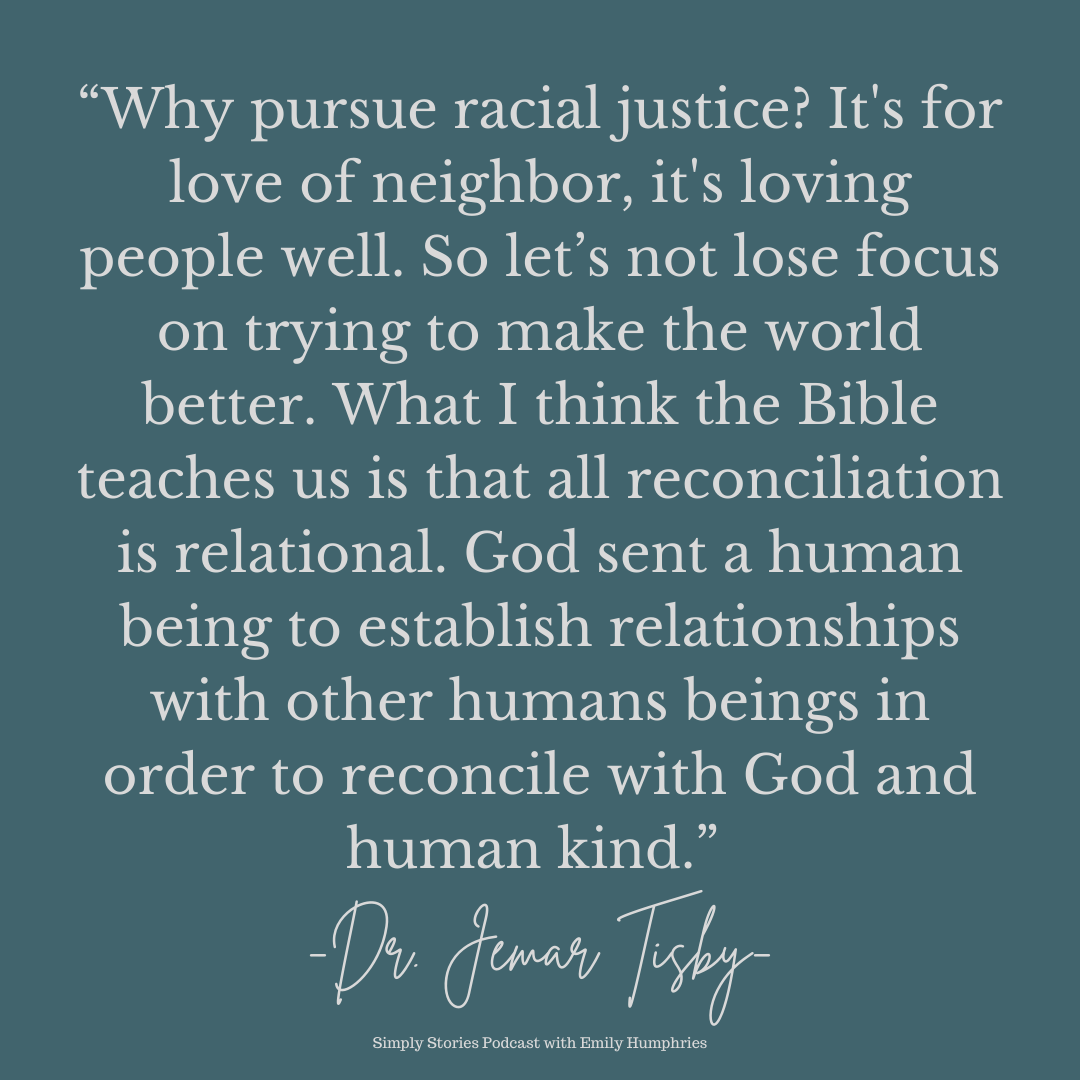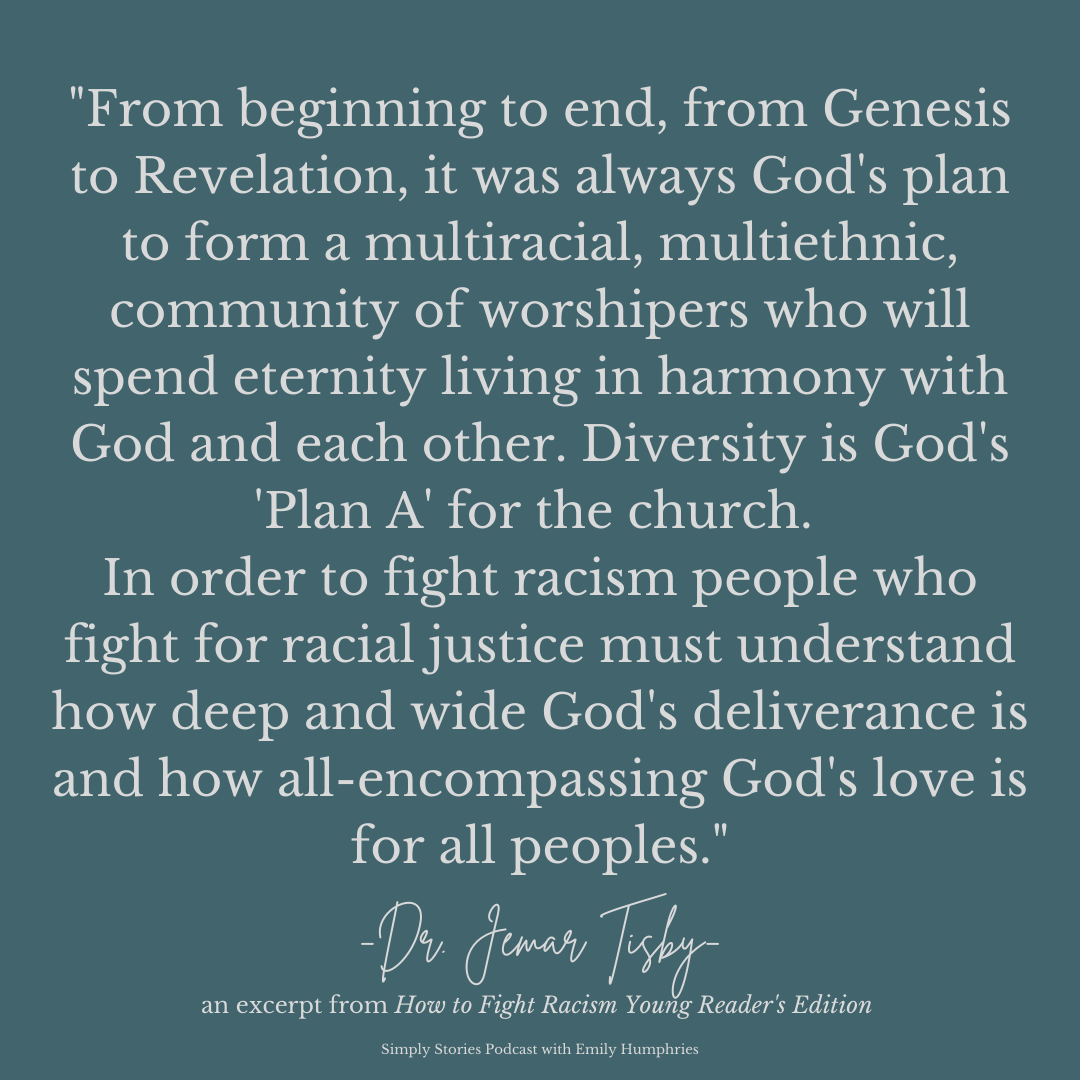Simply Table Talk :: Applying What We Hear to How We Live
We can talk and talk all day long, (which you know that I enjoy) but the tables in your homes and communities are where lives are built, relationships are restored and real change happens. Roots are pulled up and seeds are sewn where we are willing to press in and do the hard work of growing up together. That being said, I hope these types of Table Talk blogs can equip you to press in further in your own lives.
On the most recent episode of the podcast, Dr. Jemar Tisby shared eye-opening insights and shared honestly his experiences of being a Black man in the evangelical Christian space, and his books have been transformational in my journey of hearing the fuller story of the Black experience and the Church. The Color of Compromise: The Truth About the American Church’s Complicity in Racism, How to Fight Racism: Courageous Christianity and the Journey Toward Racial Justice, and How to Fight Racism Young Reader’s Edition are honest, truth-filled, powerful and instructive works on the the Black perspective of faith and race from a Gospel-centered perspective.
““To me as a historian that’s what I do is I tell stories. I tell stories of import and consequence and try contextualize them to make them stand out for how they’re still relevant for others today.””
I am so grateful for Dr. Jemar’s desire to not just diagnose the problem, but to offer a prescription and path to pursue healing. He calls us all up to walk in who God has made us to be, and his work through his books, online writings, and podcast equip us to do just that. Below, I have compiled quite a few of his questions and suggestions for further contemplation, conversation and application in your own families, neighborhoods, schools, churches, wherever the Holy Spirit may prompt you to start. I have also included some of my favorite quotes from his latest work How to Fight Racism Young Reader’s Edition. It is so powerful, because it takes these big topics that many adults don’t know what to do with, and breaks them down into more still potent, but digestible size.
Dr. Jemar Tisby’s ARC of Racial Justice: Awareness, Relationships, Commitment
Awareness- doing the learning, an acknowledgement that racism is a problem and learning about the issues
Relationships- all of our efforts go through people. Its the why. What do we pursue racial justice? Because its loving our neighbor, and because the Bible teaches that reconciliation is relationship. But it doesn’t stop there
Commitment- Dedication to dismantling and disrupting the institutional forms of racism (doesn’t just have to be federal). Our work places, our churches, our schools, our communities and even our families have policies, spoke and unspoken. How do we evaluate them and do
*Dr. Jemar talks about this on the podcast, but unpacks it at length in How To Fight Racism the original and young reader’s edition. But he doesn’t just explain it, he discusses how to apply it.
“Imagine if we as adults could interrupt that cycle with the young people in our lives so that they never had never have to say ‘I never knew.’ They would get to say ‘I grew up talking about it. I grew up doing something about this. That’s when real nation wide society wide change has a chance to happen.”
Conversations to have intentionally in church bodies in particular:
-Who do we assume we are serving when we make decisions about how we do church? Worship styles, Bible study choices, outreach opportunities, etc.
-Have you ever considered exposing yourself to other ways to worship that are not led by an entirely white leadership?
-is there a group within your body to highlight and ensure racial justice is on the radar all the time, not just every once in a while or in response to big moments in time?
-Does your church have a statement on racial justice? Is it part of your new membership curriculum?
-If you’re a church body that has existed since about the 1970’s, have you ever looked through your church’s racial history?
These are just places to begin, friends. The work matters because it is part of our call as the body of Christ. We won’t do it perfectly, but every little bit matters.
You matter, and your story matters.
xo,
Em



